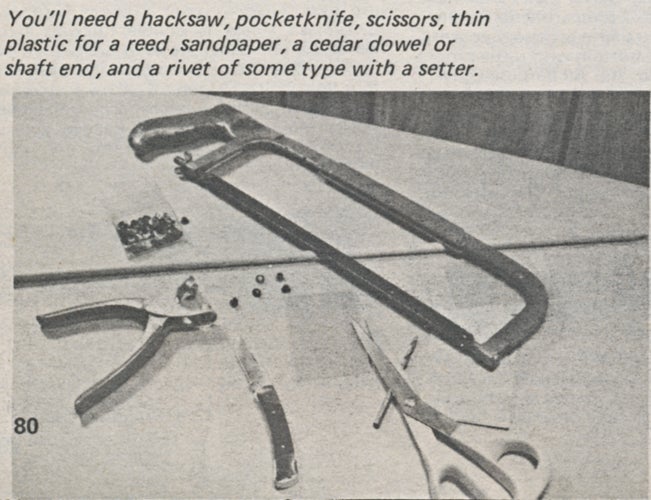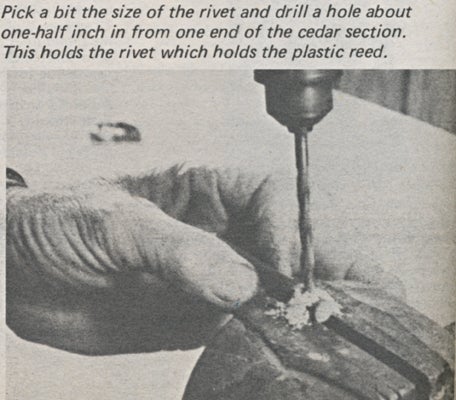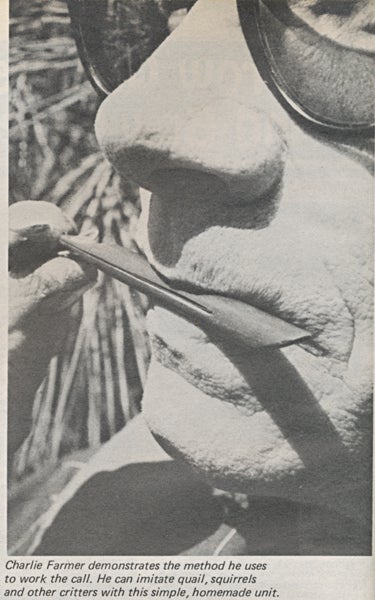Published by admin on 17 Nov 2009 at 03:13 pm
How To: Make A Small-Game Stopper By C.R. Learn
How To: Make A Small-Game Stopper
Step-By-Step Directions For A Simple, Inexpensive
Call That’ll Stop ‘Em Cold In Their Tracks
By C.R. Learn
http://www.bowandarrowhunting.com/

Rabbits Run, quail fly and squirrels dodge into holes or flip around trees when they feel they’re being threatened, right? These are their protective systems, and you can capitalize on these systems by making what I call a small-game stopper. It’s easy to make quickly if you have some broken cedar shafts laying around.
The small-game stopper actually is the idea of Charlie Farmer, who came by one day to show me his quail stopper, which is a section of cedar shafting, slotted and fitted with a piece of plastic that results in a reed-type instrument. When you blow hard into it it makes a screech like a hunting hawk and Farmer said that quails will sit and rabbis stop when they hear that screech. This gives you a chance to get within range before they take off again – a small but important edge when you’re out to bag them.

Materials needed for the small-game stopper are a section of cedar shafting (you can use a piece you cut off from the last arrow you made or a broken shaft or even a new one, if need be) a rivet or setter system of some type to clinch the end together, a rivet or an eyelet or even a small bolt to seal and hold the end of the section, a hacksaw, medium to fine-grit sandpaper, a piece of hard billfold plastic, scissors and a drill or hole punch.

Cut the shaft section to a 3 ½-inch length (you can make it three inches, but the 3 ½-inch length gives deeper tones with the plastic insert). Drill a hole through the cut section of the cedar to fit the size of the eyelet (or rivet or small bolt) you’ll be using. After the hole has been drilled take a hacksaw and cut the section down to within an inch of the end – this will give you a slot. Sand between the cut to remove the hair edges left by the saw blade. This is important because the hair grain would make a difference in the sound of your call and the tone will change as the unit wears.
At this point you will have a 31/2-inch cedar shaft section slotted and drilled on the open end. With scissors cut the plastic the width of the cedar section and a little bit longer. Insert this to within one-sixteenth of an inch from the end of the slotted cut. Don’t go all the way to the end – the plastic must vibrate and won’t be able to if you have it jammed to the end. Mark this point and take a drill or hole punch and punch a hole in the plastic for the rivet, eyelet or bolt to fit. Place the plastic and then crimp into position with the setter.
You must cut or shave the ends to fit the length of the rivet or eyelet you use. If you have a rivet that will fit without any shaving on the section, fine. If not you’ll have to cut a curved section to allow for the length of the rivet. It’s a simple task, but it must be done or the rivet can’t set.
If you’ve used an eyelet for the project, you’ll have a hole in the call that you can use for attaching a carrying cord. This will keep the unit in place when you are moving and it can hand from a belt or pin on your jacket.

As for vibrations on this project, you can vary the type of plastic used. Just remember that the thicket the plastic, the deeper the tone. Thinner plastic makes a higher screech. And, as previously mentioned, the length of the cedar section can make a difference too.
To use the small-game stopper, you blow on it, varying the intensity of your breath for the different sounds you wish to imitate – the screech of a hawk, the chatter of a squirrel, the call of a quail and so on. After you’ve made a hawk call the small game will hunker down and freeze, waiting for the deadly enemy to move on. You can take a shot then or wait until they bolt and take a running shot.
One last advantage of this inexpensive, easy-to-make unit is that you can use it to call your hunting buddies when you are in the field. That’s a far better idea than shouting while hunting.
Leave a Reply
You must be logged in to post a comment.

 Your Privacy Choices
Your Privacy Choices